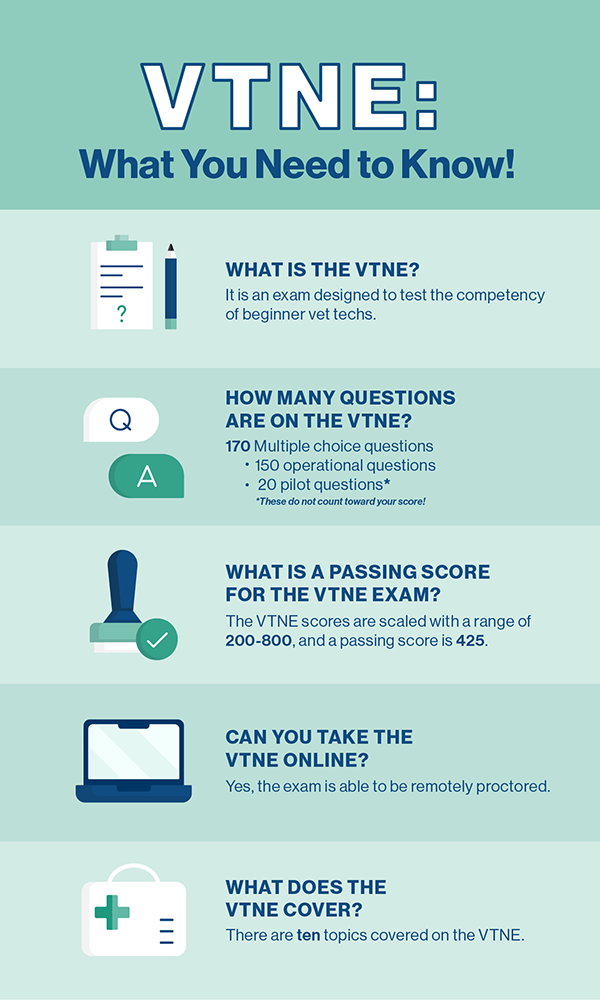
How to Pass the Veterinary Technician Exam (2024 Guide to the VTNE)
The Veterinary Technician National Exam (VTNE) is the last door to walk through to become a credentialed veterinary technician. It can be nerve-wracking, but being prepared can help you succeed. Here’s a guide full of tips to help you pass the VTNE exam!
Mar 22, 2024
5 min read
We follow strict quality and ethics policies to make sure our content is honest, accurate, and helpful. Learn more about our editorial guidelines.
For those studying to become a credentialed veterinary technician, the last check to mark off on your to do list is to take the Veterinary Technician National Exam (VTNE). Here’s everything you need to know about the VTNE and how to pass it!

What is the VTNE exam?
The VTNE exam is a 170-question test administered by the American Association of Veterinary State Boards (AAVSB). It is designed to test the competency of beginner vet techs. Passing the VTNE does not make you a credentialed veterinary technician, but it is an important step to becoming a credentialed vet tech in most states.
Read more: How to Become Certified as a Vet Tech in Each State
How hard is the VTNE exam?
It’s important to remember that “hard” is subjective. That said, this is not an exam you should take without studying. This exam covers a lot of content, so you should be sure you are familiar with it all and are prepared before test day. There’s a 70% pass rate for the VTNE, but Penn Foster students are above average with a 78% pass rate.
Learn more: How an AVMA-CVTEA accredited Vet Tech program can help you prepare to sit for the VTNE
What is a passing score for the VTNE exam?
The VTNE scores are scaled with a range of 200-800, and a passing score is 425.
How many questions are on the VTNE?
170 Multiple choice questions
- 150 operational questions
- 20 pilot questions (these do not count toward your score)
Can you take the VTNE without a degree?
Most states do require you to graduate with an American Veterinary Medical Association (AVMA) approved Veterinary Technician associate degree before you take the VTNE, but it’s important to check your state’s qualifications.
Read more: What Does a Veterinary Technician Do?
Can you take the VTNE online?
Yes, the exam is able to be remotely proctored. You can only register for this exam at certain times throughout the year, so be sure to keep an eye on the application windows.
Read more: Earning Your Vet Tech Degree Online vs. On Campus
What does the VTNE cover?
There are ten topics covered on the VTNE:
- Pharmacy and Pharmacology
- Surgical Nursing
- Dentistry
- Laboratory Procedures
- Animal Care and Nursing
- Diagnostic Imaging
- Anesthesia
- Emergency Medicine/Critical Care
- Pain Management/Analgesia
- Communication and Veterinary Professional Support Services
How to pass the VTNE
There are many things you can do to prepare for and pass the VTNE exam! From flashcards to gum chewing, we’ve got some great tips to help you earn a 425 or above on this exam.

1. How long should you spend studying for the VTNE?
You may be under the impression that studying for hours on end is the way to go. So many of us have pulled an all-nighter cramming for an exam before. The truth is that it’s actually best to study in increments under an hour. Shawna Burke, a Licensed Veterinary Technician and Veterinary Technologist with 17 years as an educator under her belt, says “the brain works best when it studies under an hour. Students often find success when studying for 45 minutes, taking a 15 minute break, then resuming studying for 45 minutes and so on.”
2. Practice
The saying practice makes perfect may not be completely true, but practice can certainly make you better equipped than going in blind. There are a few ways you can do this. At Penn Foster, you’ll have proctor exams that mimic the feel of the VTNE since both are proctored and timed, though Penn Foster's proctor exams tend to be in essay format while the VTNE reflects more of a multiple-choice format. Once you finish your 2nd externship here, you’ll receive an email from Penn Foster with a discount code for VetTechPrep, which Shawna says “is known in being incredibly helpful when studying for the VTNE.” You can also purchase practice tests from the AAVSB website.
3. Utilize AI
If being quizzed on material helps you learn, but you don’t have anyone to help you, you can turn to AI. You can use it to ask you VTNE prep questions without the pressure or embarrassment of your peer(s) watching you.
4. Flashcards
Many people use flashcards to help them learn material. This can be one of the best ways to review and make sure you know your stuff, and Shawna agrees! She says that you should “really be able to answer those review questions off the top of your head (without using your book or notes) because this is what will be asked of you when you sit for the VTNE. Flashcards strengthen that question/answer format in the brain, so when this same format is recognized during the VTNE, the brain can access answers easier.”
5. Food matters
You may crave junk food when studying for a big exam, but Shawna says that may not be the best choice.
“Having healthy snacks stimulates the parasympathetic nervous system. When students are eating something or snacking on something while they're studying, it also puts their brain into a state to receive the information better.”
She also suggests chewing gum during the exam if you’re medically able to do so. “It helps the brain concentrate and also decreases anxiety.”
6. Be kind to yourself
Positive self-talk is so important, especially when you’re facing a challenge. It’s easy for your head to fill with doubt and to question your ability at test time, especially if you suffer from test anxiety. Remind yourself you put all the work in to get where you are, and that you’re fully capable of achieving this goal. At Penn Foster, we’re here to support you, too.
“It's really important to remind our students that self-care and internal encouragement is massive,” says Shawna. "You have to give yourself grace.”
7. Don’t give up
So what happens if you don’t pass the VTNE? Discouragement may start to creep in if this happens, but it’s important not to let it. Shawna says that “there are brilliant, awesome, capable people that have to take the VTNE more than once. No one talks about that, and that doesn't mean that they weren't capable of doing this.”
You know what they say- if at first you don’t succeed, try, try again!
Achieving success
If you’re ready to take the next steps toward becoming a credentialed veterinary technician, take a look at Penn Foster’s Veterinary Technician program and get on your way to taking the VTNE today!



